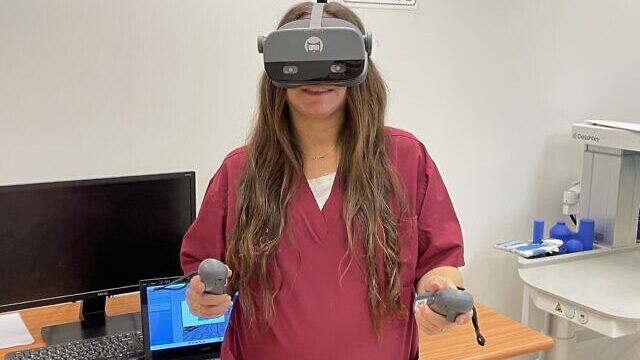01/17/2024 – 3:31
Occupational therapist Chen Bin Dan wears high-tech glasses and holds game controllers. It looks like she's playing a video game, but what she's doing is demonstrating how virtual reality (VR) is being used at the Sheba Medical Center Rehabilitation Hospital in Israel to help patients recover from brain injuries.
Sheba is working with XRHealth, an Israeli startup working in therapeutic virtual reality and augmented reality (AR), to provide this immersive approach to its patients. XRHealth partners with ARC Innovation, Sheba's global network, to transform healthcare for the future.
“We're not just playing with technology. We really understand it and know how and when to use it,” said Ravid Sehgal, chief technology officer at ARC Innovation's XR Center. (XR stands for extended reality, which includes virtual reality and augmented reality.)
The XRHealth VR system can be used in the hospital or at home under remote medical supervision to improve cognitive and motor skills.
To use the portable, compact system, occupational therapist Ben Dunn simply brings the special headset, hand controls and a laptop programmed with special software into the patient's room.
“This game-like approach creates more motivation for the patient and is especially beneficial for young people who grew up playing video games. I've noticed that recovering Soldiers in our department really enjoy it,” Ben Dunn said.
Ben Dan described the XRHealth system as “another technology tool that we have to help with our work.”
When it comes to individuals with brain injuries, this involves improving memory, attention, and balance. Ben Dan also works with his patients to deal with lack of inhibition and impulsivity, common side effects of brain damage.
Although Ben Dan uses the system with patients with brain damage, it can also be used in occupational therapy for all different types of rehabilitation.
“All VR activities are specifically geared toward rehabilitation, and as with regular computer games, the difficulty increases every time the patient reaches a certain level,” Ben Dan explained.
According to Maya Erlich, director of XR programs at ARC Innovation, XRHealth has donated ten of its headsets to the Chiba Rehabilitation Hospital since the beginning of the war. They are used for a different purpose with patients.
“Technicians and volunteers walk around the departments and ask patients if they want to use the systems to watch relaxing scenes to reduce stress or pain,” Ehrlich said.
“Some patients find this really helpful. We are studying the effects of this and also how the system can be used to treat PTSD,” she said.
follow her that it In the Google News And receive alerts about major news

“Wannabe internet buff. Future teen idol. Hardcore zombie guru. Gamer. Avid creator. Entrepreneur. Bacon ninja.”

